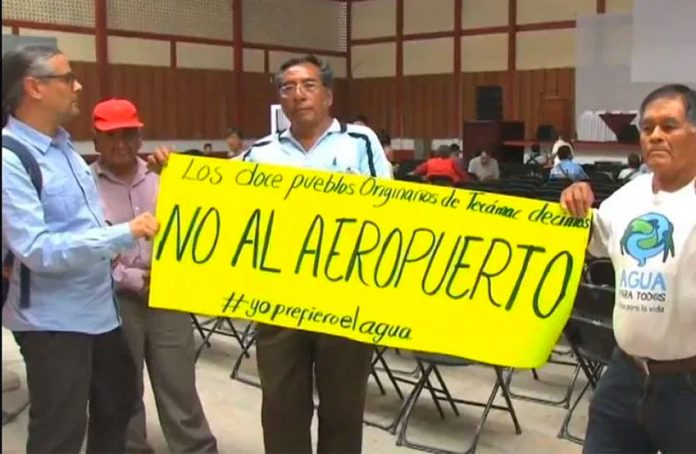More concerns have been raised about the impact that the new Santa Lucía airport will have on already depleted water resources in nearby México state communities.
Environmentalists have already warned that the project to be built at the Santa Lucía Air Force Base might lead to water supply problems and now people who live near the site – located about 50 kilometers north of central Mexico City – have voiced their concerns in interviews with the news agency Reuters.
Filiberto Mena Laiza, a 54-year-old former indigenous farmer who operates a taco stand in San Lucas Xolox, a town five kilometers from the Santa Lucía site in the municipality of Tecamac, expressed doubt that there will be sufficient water to supply the airport.
“Water is a vital liquid that moves us all,” Laiza said. “Where will all the water that will be needed to maintain this monster come from?” he asked, referring to the 36-square-kilometer airport project.
“The process of human development can’t be stopped,” Laiza conceded before adding: “What worries me is what are we going to leave for those that come after? . . . Just garbage.”
Mateo Martínez Urbina, a doctor in Tecamac and president of the local water board, said the US $4.8-billion airport will attract complementary infrastructure, which will place even more pressure on natural resources and alter the countryside.
“Logically, casinos, hotels and shopping malls are going to arrive,” he said. “More than benefits, [the airport] is going to bring us much harm.”
Federal Environment Secretary Víctor Manuel Toledo Manzur told reporters this month that the operation of the airport won’t cause any major water supply problems because water will be carried to the site from the Mezquital valley in Hidalgo via an aqueduct to be built by the National Water Commission.
But environmental experts say that residents’ concerns about water supply are well founded.
A 2015 study by the federal government found that the aquifer beneath the Santa Lucía site and surrounding areas was operating at a deficit of 58 million cubic meters per year. But according to a scientist and professor at the Latin American Technological Institute, the deficit is much greater.
Eric Galindo Castillo told Reuters via email that the government figures don’t take into account dozens of illegal wells in the area. The real water deficit is closer to 400 million cubic meters annually, he said, adding that the figure will increase further once construction of the airport begins.
“It’s unimaginable,” Galindo said about the airport project. “It lacks planning. You put more infrastructure, you’re going to take more water. But from where?”
The academic said the plan to bring water from Hidalgo is not viable because of the size of the airport project, adding that the aquifer in that state is heavily contaminated.
“Pollution [in the Hidalgo aquifer] is primordial,” Galindo said. “The moment you extract more water, you’re going to leave all those contaminants in the subsoil.”
Construction of the airport is currently held up as the government seeks to resolve more than 80 injunction requests filed by #NoMásDerroches (No More Waste), a collective made up of civil society organizations, law firms and more than 100 citizens.
The group said in June that it believed that reviving the abandoned Texcoco airport project, which President López Obrador canceled after a legally questionable public consultation last October, is “legally possible.”
One of several legal rulings handed down by judges in the collective’s favor overruled the environmental approval granted for the project by the Environment Secretariat in July.
However, López Obrador, who claims that the group’s opposition to the airport is politically motivated and that its injunction requests amount to “legal sabotage,” is adamant that the project will go ahead. The president says that once construction begins, the Secretariat of Defense will complete the project in a period of three years.
Despite the delays, local residents have resigned themselves to the fact that the airport will eventually be built.
“We’re not going to be able to stop it, we have to be honest with ourselves,” said Laiza, the taco vendor. “I just want them to respect my town.”
Source: Reuters (en)
